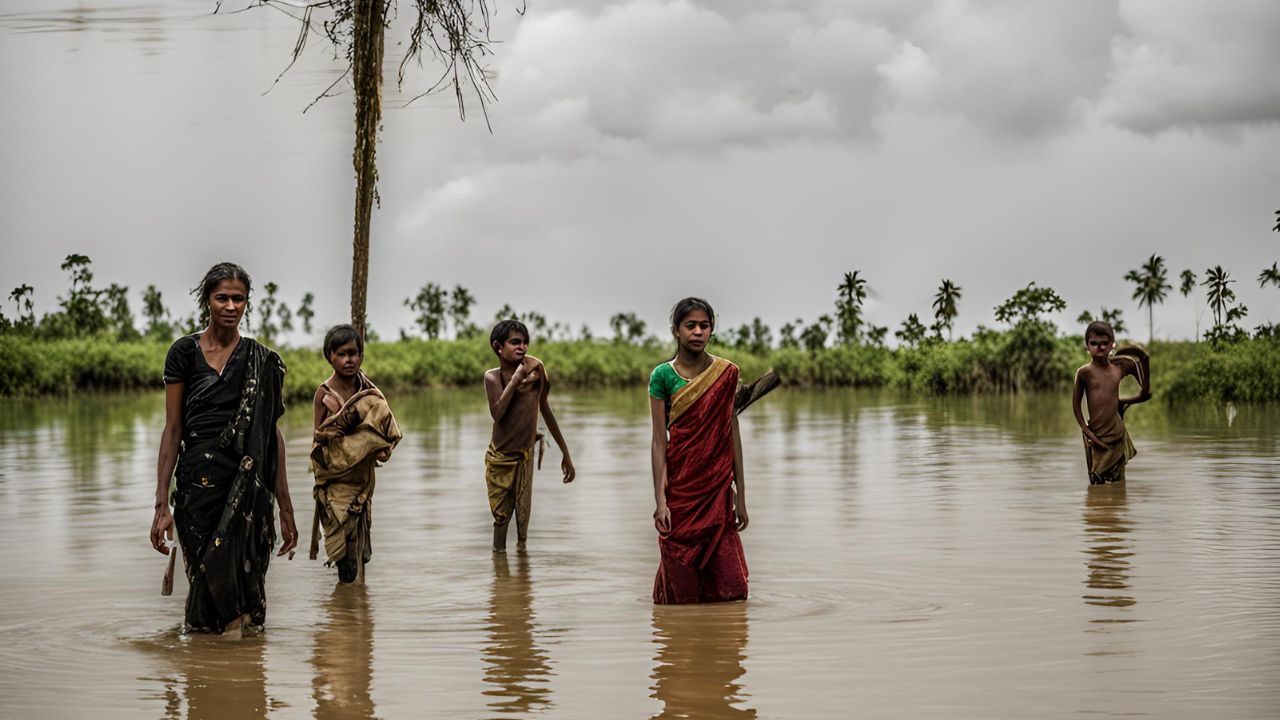Climate Change and Its Impact on Bangladesh

Bangladesh, a South Asian nation crisscrossed by rivers and boasting a lush, low-lying delta, is acutely vulnerable to the impacts of climate change. The nation's unique geography, combined with its socio-economic challenges, makes it particularly susceptible to climate-related hazards. This essay explores the multifaceted impacts of climate change on Bangladesh, focusing on sea-level rise, increased frequency of natural disasters, changes in agricultural productivity, and public health concerns.
1. Sea-Level Rise
One of the most significant threats posed by climate change to Bangladesh is sea-level rise. The country’s topography is predominantly low-lying, with approximately 10% of its land area lying below 1 meter above sea level. As global temperatures rise, polar ice melts, and thermal expansion occurs, sea levels are projected to increase, exacerbating the risk of coastal inundation. Studies predict that by 2050, sea levels could rise by 0.5 to 1.5 meters, potentially displacing millions of people from coastal areas and leading to the loss of valuable arable land .
2. Increased Frequency of Natural Disasters
Bangladesh already experiences a high incidence of natural disasters such as cyclones, floods, and droughts. Climate change is expected to intensify these events. Cyclones, originating in the Bay of Bengal, are projected to become more frequent and severe, bringing stronger winds, heavier rainfall, and greater storm surges. Floods, particularly during the monsoon season, are likely to become more severe due to higher river flows and melting glaciers in the Himalayas, which feed the Ganges-Brahmaputra-Meghna river system. These changes could result in more devastating floods, with severe implications for human settlements, agriculture, and infrastructure .
3. Agricultural Productivity
Agriculture, a critical sector for Bangladesh's economy and food security, is highly sensitive to climatic variations. Changes in temperature, precipitation patterns, and the increased frequency of extreme weather events are expected to negatively impact crop yields. Rice, the staple food, is particularly vulnerable to high temperatures and flooding. Salinity intrusion, resulting from sea-level rise and increased tidal surges, further threatens agricultural productivity, particularly in the coastal regions where saline water can render the soil infertile. These challenges are likely to exacerbate food insecurity and increase dependency on food imports .
4. Public Health Concerns
Climate change also poses significant public health challenges in Bangladesh. Rising temperatures and changing precipitation patterns can lead to the proliferation of vector-borne diseases such as malaria and dengue fever. Flooding and cyclones can contaminate drinking water sources, leading to waterborne diseases like cholera and diarrhea. Additionally, the displacement of communities due to flooding and erosion can result in overcrowded living conditions in urban slums, exacerbating health risks and placing additional strain on healthcare systems .
5. Socio-Economic Impacts
The socio-economic impacts of climate change in Bangladesh are profound. Displacement due to sea-level rise and extreme weather events can lead to loss of livelihoods, particularly for those dependent on agriculture and fisheries. The resulting migration from rural to urban areas can strain urban infrastructure and services, leading to increased poverty and social tensions. Moreover, the economic costs of disaster response and rebuilding efforts can divert resources from other critical development needs, impeding overall economic growth and progress .
Conclusion
The impacts of climate change on Bangladesh are far-reaching and multifaceted, threatening the country's environment, economy, and society. Addressing these challenges requires a comprehensive approach that includes enhancing disaster preparedness, investing in resilient infrastructure, promoting sustainable agricultural practices, and improving public health systems. Additionally, international cooperation and support are crucial in helping Bangladesh mitigate and adapt to the adverse effects of climate change, ensuring a sustainable and resilient future for its population.




